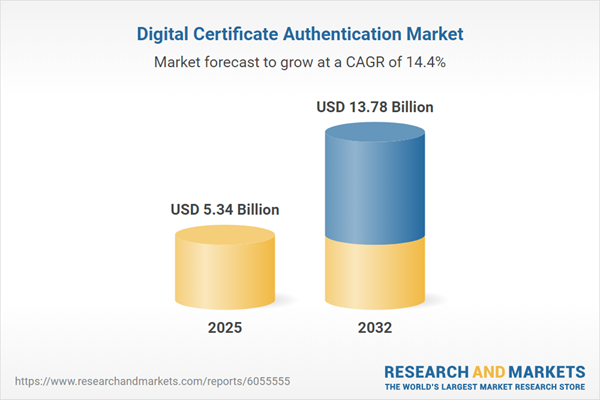Speak directly to the analyst to clarify any post sales queries you may have.
Digital certificate authentication is an essential foundation for trust and security in today's interconnected business landscape. As cyber risks grow and regulatory standards intensify, senior leaders are prioritizing authentication strategies to protect organizational integrity and resilience. The digital certificate authentication market demonstrates dynamic evolution—driven by innovation, regulatory momentum, and new deployment models—which warrants careful evaluation.
Market Snapshot: Digital Certificate Authentication Market Overview
The global digital certificate authentication market grew from USD 4.70 billion in 2024 to USD 5.34 billion in 2025 and is forecast to reach USD 13.78 billion by 2032, achieving a CAGR of 14.39%. Market momentum is guided by rising demand for secure online transactions, expanding digital adoption across sectors, and the critical need for robust trust frameworks amidst evolving threat landscapes.
Scope & Segmentation
- Offering: Services, Software
- Certificate Type: Certificate authority (CA) certificates, Client certificates, Code signing certificates, Signature-verification certificates, SSL/TLS certificates
- Deployment Mode: Cloud-based, On-premise
- Enterprise Size: Large enterprises, Small & medium enterprises
- Industry Vertical: BFSI, Education, Healthcare, IT & Telecommunication, Manufacturing, Retail & E-commerce
- Region:
- Americas: United States, Canada, Mexico, Brazil, Argentina, Chile, Colombia, Peru
- Europe, Middle East & Africa: United Kingdom, Germany, France, Russia, Italy, Spain, Netherlands, Sweden, Poland, Switzerland, United Arab Emirates, Saudi Arabia, Qatar, Turkey, Israel, South Africa, Nigeria, Egypt, Kenya
- Asia-Pacific: China, India, Japan, Australia, South Korea, Indonesia, Thailand, Malaysia, Singapore, Taiwan
- Key Companies: Actalis S.p.A., AppViewX, Inc., Asseco Data Systems S.A., Buypass AS, DigiCert, Inc., Entrust Corporation, GlobalSign K.K., GoDaddy Operating Company, LLC, IBM Corporation, IdenTrust, Inc., Microsoft Corporation, Network Solutions, LLC, OneSpan Inc., Oracle Corporation, RSA Security LLC, Sectigo Limited, Securemetric Technology Sdn Bhd, SSL Corp, SwissSign Ltd., T-Systems International GmbH, Thales Group, Trustwave Holdings, Inc., WISeKey International Holding AG
Key Takeaways for Decision-Makers
- The deployment of certificate-based authentication enables organizations to strengthen trusted digital identities across increasingly distributed environments.
- Adoption of cloud-based and automated PKI solutions continues to accelerate, reducing operational burdens and enabling agile scaling for enterprise deployments.
- Emerging standards such as zero trust and identity-centric security models are encouraging broader use of certificate authentication at all critical access points.
- Sector-specific priorities—such as regulatory compliance in finance and healthcare or rapid provisioning in technology—are influencing certificate adoption and management approaches.
- Larger enterprises often invest in advanced in-house solutions, whereas small and mid-sized businesses tend to favor integrated services and bundled offerings for efficiency.
- Regional compliance requirements, especially in Europe and Asia-Pacific, play an influential role, with pan-border interoperability and government-supported digital identity schemes shaping adoption patterns.
Tariff Impact on Digital Certificate Authentication
United States tariffs introduced in 2025 have generated cost pressures for vendors, system integrators, and users of hardware-based authentication solutions. These changes have led procurement teams to reevaluate suppliers and explore software-driven key management as alternatives. In response, global certificate authorities have adapted pricing structures and service packages, compelling organizations to prioritize essential projects and consider bulk agreements to manage costs effectively. These tariff-induced shifts emphasize the significance of diversified procurement strategies and flexible authentication deployment models to sustain business continuity.
Methodology & Data Sources
This analysis integrates primary interviews with CISOs, PKI architects, and vendor executives alongside comprehensive reviews of technical documents, regulation overviews, and whitepapers. Expert consultations by cybersecurity specialists further ensure depth and relevance within the research findings.
Why This Report Matters
- Enables senior leaders to identify high-priority investment areas and refine digital trust strategies against ongoing cyber threats.
- Supports strategic planning for authentication ecosystems spanning multiple deployment modes, certificate categories, and compliance requirements.
- Offers clear insights into vendor differentiation and evolving technology trends impacting future authentication decisions.
Conclusion
Robust digital certificate authentication is essential for safeguarding modern digital interactions. Senior decision-makers can drive value by embracing adaptable, compliant, and scalable authentication solutions aligned with business objectives and emerging threat landscapes.
Table of Contents
3. Executive Summary
4. Market Overview
7. Cumulative Impact of Artificial Intelligence 2025
Companies Mentioned
The companies profiled in this Digital Certificate Authentication market report include:- Actalis S.p.A.
- AppViewX, Inc.
- Asseco Data Systems S.A.
- Buypass AS
- DigiCert, Inc.
- Entrust Corporation
- GlobalSign K.K.
- GoDaddy Operating Company, LLC
- IBM Corporation
- IdenTrust, Inc.
- Microsoft Corporation
- Network Solutions, LLC
- OneSpan Inc.
- Oracle Corporation
- RSA Security LLC
- Sectigo Limited
- Securemetric Technology Sdn Bhd
- SSL Corp
- SwissSign Ltd.
- T-Systems International GmbH
- Thales Group
- Trustwave Holdings, Inc.
- WISeKey International Holding AG
Table Information
| Report Attribute | Details |
|---|---|
| No. of Pages | 191 |
| Published | November 2025 |
| Forecast Period | 2025 - 2032 |
| Estimated Market Value ( USD | $ 5.34 Billion |
| Forecasted Market Value ( USD | $ 13.78 Billion |
| Compound Annual Growth Rate | 14.3% |
| Regions Covered | Global |
| No. of Companies Mentioned | 24 |









